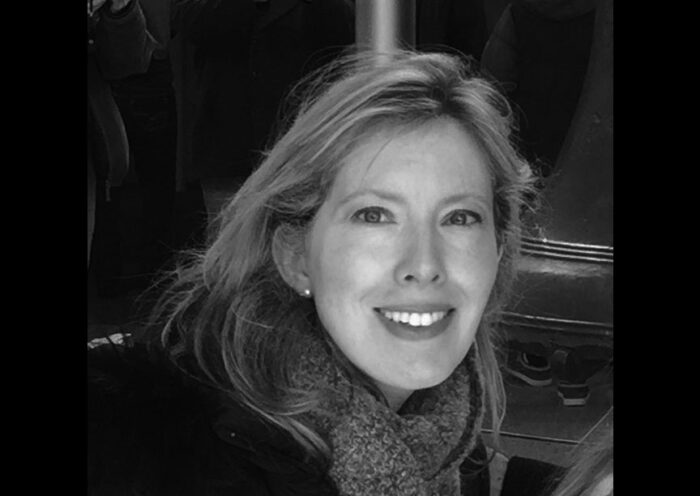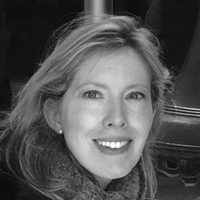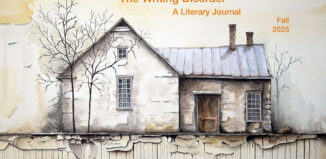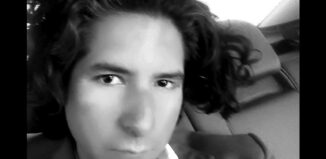The Wedding Cake House
by Amy Cacciola
The white stucco chimney of the house next to my childhood home has a hole in its side the size of Santa Claus, and every Sunday when we visit my parents, my two boys point in wonder to the men hanging from the scaffolding who are taking it apart, piece by piece. In a few weeks, the original wood beams of its frame are bared and by early December, when the men begin to tackle the roof, my youngest worries out loud, “But how will Santa Claus park his sleigh there?”
“There aren’t any children living there yet, remember, Danny,” I reassure him, as we all troop into his grandparents’ house, my husband, Bill, reluctantly following us in.
Sunday is the day for family visits, the day for small home repairs and computer advice, and for helping to clean out the attic in preparation for my mother’s death—an event for which she’s been preparing without specific cause for years. To the boys I just say, “Grandma wants to make more room for you to play,” and I load them down with boxes of my prom dresses and high school yearbooks, loop them into their great-grandmother’s hand-crocheted scarves until I can barely see their eyes, and send them back to the car like little Michelin men while Bill escapes with my father into the backyard with a can of paint. Like me, my dad can’t bear to throw away his past. “Goddamn Marie Kondo,” he’ll say, jutting his chin towards my mother. “She’d burn everything to the ground if we let her,” and so we’ve both developed the habit of checking the trash before it goes out.
“I guess he bought the house for the land,” I remark as my mother and I linger on the front stoop, where despite the cold her geraniums thrive in oversized pots, one per step. It’s an orderly block, with lawns trimmed like neat goatees in the summertime and Christmas decorations that never overstay their welcome. Although there are no rules governing what color you can paint your house or how late your kids can ride screaming through the street on their bikes, you will see couples slow down by the Wedding Cake House on their evening strolls, remembering the man who built it for his new wife, to commemorate their love, and shaking their heads over what’s become of its snow-white frosting. I suppose the demolition of any landmark draws two kinds of observers: those who witness its death almost bodily, feeling the thousand paper cuts, and those who thrill to the possibility that it will go up in flames. I’m firmly on the side of Mrs. Murray, who walked away with a layer of stucco curled in her palm like the body of Christ, but this means I’m not on my mother’s side, which is never a comfortable place to be.
“Syed says he wants the chimney to be shorter,” my mother explains, gazing up at the hole with one hand shading her eyes and a concentration very like that of a bird-watcher who believes she has spotted a rare robin. Her eyes are a particular shade of blue gray and they have always registered everything. Although she must be nearing eighty, she has never worn glasses. When we were children she would send my sisters and me to the front of the line at the DMV to read the very smallest letters on the eye chart, and today when I struggle to read the fine print on my father’s medication she tells me that she doesn’t need reading glasses. Her vision is perfect. She sees Syed in the distance and waves. We’ve been here before, and as with every man who has had the misfortune to move into a house beside, before, or behind hers, I know that Syed will soon see her fascination for him fade into disgust. Men with big plans—men with the tools and the muscle and the money to build a perfect home—become over a series of months (one time the honeymoon was as long as a year) men who throw garbage down from the roofs and who operate heavy machinery that gets too loud. So loud it feels as though it’s your house, not theirs, that’s being torn down. But today, a Sunday so clear and cold the nuclear bloom of each layer of falling stucco hangs in the air for several minutes before wafting away—today we are still in the early stages of love. Water is on offer on the days the plumbing has to be shut off, and there are cookies to be delivered once they have cooled. A bag of summer tomatoes dropped off on a neighbor’s doorstep, a parcel of mail delivered when they return from vacation, these are the kinds of good deeds one expects of good neighbors, and in return there are paths forged through the snow during winter blizzards and heavy pieces of furniture moved from one room to another—things my father can no longer do and for which my mother seems to view him, witheringly, as useless.
For the past several years now, they have spent their time in separate rooms, and I go from one to another as though visiting them in different countries. With one I sit on the couch and stare at the shelves of childhood trips chronicled in fading Polaroid shots, gently whacking my father on the knee every so often to prevent him from falling asleep while I am talking to him about the things we have in common: the sly navigation of office politics and the black-and-white films we both love—William Holden movies where the suave leading man doesn’t always get the girl. In the other room, with the girl I always thought my father married for love, I speak another language that feels thick, like cream, my tongue slick with the white lies I have taught the boys that people sometimes have to tell to keep the peace. Is it too cold in the house? Not at all. Do I mind returning her birthday sweater, or did I want her to try it on to prove how poorly it fits? No, Ma. It’s not a problem. I believe you. I help with the dishes, watching her dunk her left hand with its pear-shaped diamond ring deep into a mountain of suds, and it isn’t difficult to imagine her disappointment that the mountains that rise outside her window are the dirt mounds of Staten Island rather than the Himalayas or the Andes. But people don’t get divorced in their seventies, I tell myself, feeling like a small child for the first time in years, as upset as my son is at the thought of Santa not being able to land on the roof. Perhaps all of childhood is a fairytale we tell ourselves, but there’s no time for self-pity. There’s the crack of my eldest’s voice, breaking at the very top notes, reminding me that I’m the mother now and demanding that I follow him down the dank basement steps and into the light of the yard, where the sound of the house next door flapping its tarps in the breeze like a duck shaking out its feathers is like a slap in the face, and there on the very top step of a two-story ladder is the man I married two decades ago, scraping at the flaking paint of several years of weather coating, his own coat flapping in the breeze as well. It’s his good wool coat, paired with his good dress shoes, and he looks annoyed when I suggest he might slip or wreck his loafers, probably because he thinks I care more about the shoes.
“Paul, go hold the bottom of the ladder,” this whispered to my eldest, knowing that it won’t fool his father in the slightest. Using children as my secret emissaries is probably on the list of things I share with my mother that he hates most, along with a too-practical nature that can weep over someone’s death and in the next moment inquire about their will. We all have our flaws—his being that he says yes to everyone, as though he lives to serve, which is how he ended up on the top of this ladder.
“I don’t want you to fall,” I say, I still don’t want you to fall, I think, and my father takes my hand in his dry one for a moment. When he drops it, he does what he always does with his hands when he wants to make a point, rubbing thumb and forefinger together like a magic trick to make them sound like something being tightened, like something hard that will never break.
“I tried to do it myself, when your mother asked. It was on her list. Don’t let her know what happened. Don’t let her win,” and he shows me the root of the tree that tripped him, mimes how he lay on the ground looking up at the white sky through its black branches, ten minutes, twenty minutes. He kept his wits about him, “Had my phone on me. Almost called you,” but after a while got up and said to himself, “You’re all right.” I ask about bruises; get him some pain medicine from the bathroom without letting anyone see what I’m doing; tell him to take a hot bath; and then Danny comes outside with his grandmother in tow, and we fall silent. For the first time I’m grateful that there are men working next door, making noise and speaking in at least two different languages. Even on a Sunday, there are probably ten of them ferrying rocks and dirt down and out to the dumpster.
“He’s built-out the back room all wrong—the angle’s not ninety degrees. That’s going to cost him,” my father says, the general contractor in him calculating the extra time and labor needed to rip it out and redo it. All those years in the bowels of the New York City subway system have left their mark. He can only hear well from his right ear, and his left shoulder is slumped like the concrete he slumped and tested, and slumped again until he knew it was strong enough to hold. We all sit down at the picnic table in rocking metal chairs that have retained the dry fall leaves in their nooks and crannies, and make crunching noises as we rock. There is no snow.
“It’s not so bad, building something at ground level,” my Dad remarks, not needing to explain how important light would be to a man who spent so many years underground, nor that these men can point to the house as something they’ve accomplished without having to drag their children to the back door of the Number 1 subway train as it went by mile marker 6572. “There’s where I chipped out the tunnel and built it back up.” To my mother, the new structure is all about progress. Gone is its frumpy, stubbly white skin and in its place are smooth planes that catch nothing, not even the rain, which bounces off them like fat sizzling in a frying pan. For the past couple of years, the construction has been the only thing my parents have come together to talk about, and it’s momentarily comforting to see them rallying back and forth about the color of the ornamental shutters or the shape of the hand-hewn stones that have replaced the asphalt driveway. They both like black. They both hate octagons. There were years when they both loved each other.
“Why don’t you let me show you around?” my mother offers now that the men have begun to pack themselves into Syed’s truck, but I don’t want to go inside a stranger’s house, and besides, it’s nearly time to go. Bill is rocking nervously in his chair, his hand in his pocket over his phone, which he knows better than to take out; and the boys are playing with a huge stick in a way that’s likely to end badly if we don’t leave soon.
“It’s not like I’m asking you to do something illegal. But if you don’t want to go, of course I wouldn’t want you to do anything that makes you feel uncomfortable. I was only going to show you the fireplace Syed put in last week,” she says, a master at the passive-aggressive guilt trip. That bag of tomatoes was my job to deliver, the mail my sisters’ to collect from front porches that creaked with ghostly emptiness. Taking the tray of cookies from her, I fall effortlessly back into the role of emissary. Why she has a key is unclear, since the men have their own, which they use to let themselves in to wash their hands at the kitchen sink or in the downstairs bathroom; their dusty footprints are captured on brown paper paths taped to the floor leading to each. The rest of the house is an empty, echoey maze of pine studs, and we lay the tray down in the kitchen on top of an open framework that will probably turn into an island grilling station. In the middle of this geometric maze, my mother looks small but somehow at ease.
“The top of the island will be black marble,” she says, spreading her hands out over the wooden beams so that I can almost imagine the cool stone pooling out in smoothed waves.
“Don’t you love the clink of a glass set down on stone?” she asks dreamily, but I’m a little distracted by the pitch of the ceiling, thinking that my father’s right about the structure, and through the side door, I’m also keeping track of my sons, who have ditched the stick in favor of a game of catch with their father. The ball boomerangs in that perfect curve of give and take, father and son, adult and child, and I’m so awash in nostalgia for a past that’s not yet past that I haven’t even noticed the tour hasn’t yet ended.
“All stainless, Syed says, for the appliances. And we can have the pool you always wanted—the one your father said would make the backyard collapse into the ravine behind the house.” She pauses, her eyes very blue again. “You know, the only reason we went to Jerusalem was because I convinced your father to go there. You should see him talking with Syed, always about how much he loved seeing the mosques, as though it was his idea to go there.”
For a moment, I’m confused. We’ve talked so many times about how nice it would be if they threw caution to the wind and finally got a pool for the boys, since we don’t have room for one where we live. When I join her at the back of the house to peer into the ravished yard, she points to the spot where a kidney-shaped hole half filled with concrete takes up most of the garden, and the “we” begins to sink in. Part of me wants to believe that she’s only pointing out what could have been, but I follow her train of thought back to Syed, whose new house with its multiple bathrooms will enable his family to purify themselves before prayers. It’s not hard to imagine that at the end of a fifty-year marriage, the places you wanted to go become more important than the places you went, and the traits you thought you could shape into something else remain stubbornly unchanged, like a block of marble that reveals the same figure no matter how you chisel away at it.
“We’ll go to Riyadh first, to visit his parents. To Mecca of course, to say our prayers.”
Perhaps my next questions should have been to ask what year it was or the name of the current president of the United States. But we’d just talked about him and the anger had risen in both my parents—the blue Democrat’s veins bulging and the Republican’s neck flushing red. Instead another memory comes of the woman who moved into the Wedding Cake house to serve as a companion and nursemaid to the wife, after the man who built it had died. We’re standing in front of the fireplace she has brought me here to see, before which lie two tasseled rugs arranged for prayer, and the ease with which she sinks down onto one of them—at her age—into a cross-legged position surprises me no more than her familiarity with the space.
“Do you remember that night, so many years ago, when the shade snapped up in the living room window? I think it was that one right there, and we saw the two women kiss.” This was long before such a thing was commonplace and the women, two Irish Catholic biddies with long gray hair, were the kind who never missed mass. But my mother isn’t listening. She is twisting the key in her hand, and she’s getting up and motioning that it’s time for her to lock up.
It’s started snowing and Danny is bawling on the couch next to his grandfather. Paul caught more balls than he did and his father wouldn’t let him help carry the Christmas tree down from the attic, nor help to set it up in the living room where my father has cleared a spot for it by moving the potted plants he brings in every winter so they don’t die.
“Danny, if you just calmed down, I’d let you put the branches in the holes, but I don’t think you can see where to put them with all those tears blurring your vision …” There’s a fig tree, the kind the Italians usually wrap in burlap and leave outside but which we’ve found does pretty well indoors, and some palm trees that don’t like snow. My mother bustles around with the ornaments, and more boxes of old toys from the attic, which she’s piling up at the front door for me to take. There’s a box of clay pinch pots from grade school, some Mother’s Day and birthday gifts that I object to having returned but decide to keep my mouth shut after she explains, “Don’t you want the boys to see what an artist you were when you were little?” She’s busying herself with a box of file folders that need to be rearranged to fit into it and on top of which she carefully places a much-folded wad of papers from her apron pocket.
“Your original birth certificate,” she announces, “your sisters’ too. And all your school records,” gesturing towards the box with one fluttering hand as if to say, now you can take it away.
“So many things in the attic that I don’t need. Swedish death cleaning,” she says, just out of the boys’ earshot. “The Swedes got a lot of things right.”
“So, apparently, did the Arabs,” I shoot back, but the comment is lost in the flurry of goodbyes and the packages, which Danny protests is the reverse of Santa Claus.
“You’re not supposed to give presents back!”
Later, getting ready for bed I recount the whole experience to Bill and he laughs, telling me we’ll know soon enough if she’s getting ready to die or to move out.
“I did see a suitcase in the hall …” And he repeats what he’s always said about her. That she’s a woman ripe for conversion to any religion whose hold on its followers is stronger than hers.
“But it’s not about faith,” I argue. “I’ve never known a more devout Catholic, despite the fact that that she seems to be heading to Mecca.”
“Isn’t it, though? What do you call it when you reject your entire past if not a crisis of faith?”
As he sees it, she’s injured me far worse than my father. Rejecting their marriage isn’t that big a deal, even at her age.
“I mean, they don’t see eye to eye on anything except that house. Splitting up would be a good thing for both of them.”
But rejecting her children, even symbolically, even in “crazyland,” was a step too far.
“Poor little orphan,” he croons, spooning me in bed and brushing his hands through my hair. “Poor motherless you.”
BIO
Amy Cacciola’s work has been featured in Marrow Magazine, Epiphany Magazine, and Roger Rosenblatt’s podcast, Write America. In her blog, Me, Moon!, she played second fiddle to her sassy, five-year-old daughter as they debated everything from the walking speed of sloths to the origins of Trump’s family separation policy and the meaning of death. She is a graduate of Vassar College and Columbia University, and lives in Brooklyn. www.amycacciola.com



















